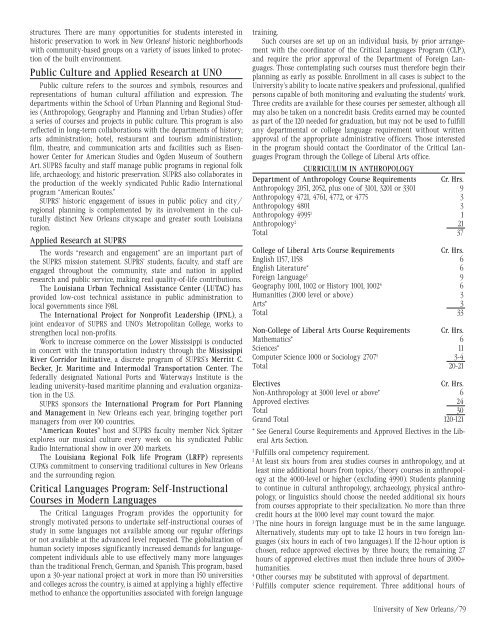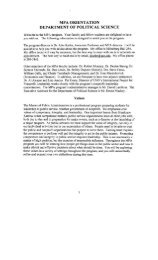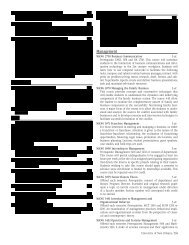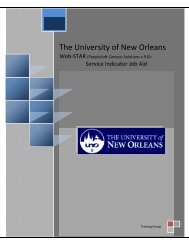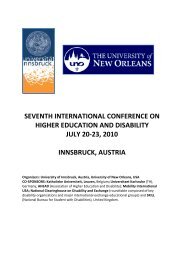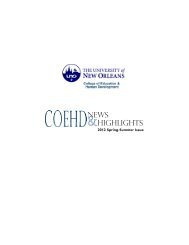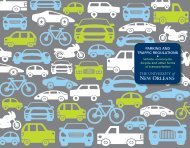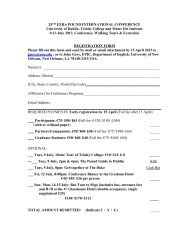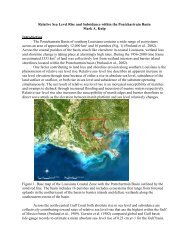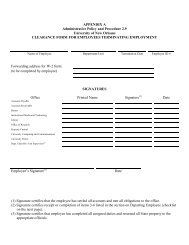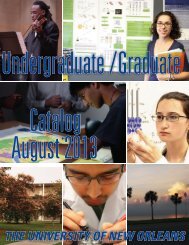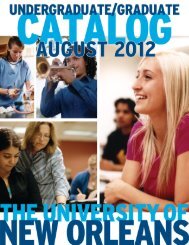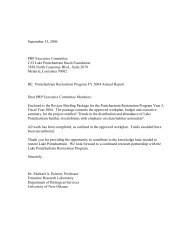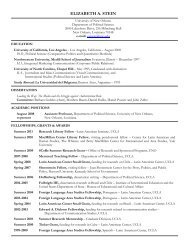Untitled - University of New Orleans
Untitled - University of New Orleans
Untitled - University of New Orleans
Create successful ePaper yourself
Turn your PDF publications into a flip-book with our unique Google optimized e-Paper software.
structures. There are many opportunities for students interested in<br />
historic preservation to work in <strong>New</strong> <strong>Orleans</strong> 1 historic neighborhoods<br />
with community-based groups on a variety <strong>of</strong> issues linked to protection<br />
<strong>of</strong> the built environment.<br />
Public Culture and Applied Research at UNO<br />
Public culture refers to the sources and symbols, resources and<br />
representations <strong>of</strong> human cultural affiliation and expression. The<br />
departments within the School <strong>of</strong> Urban Planning and Regional Studies<br />
(Anthropology, Geography and Planning and Urban Studies) <strong>of</strong>fer<br />
a series <strong>of</strong> courses and projects in public culture. This program is also<br />
reflected in long-term collaborations with the departments <strong>of</strong> history;<br />
arts administration; hotel, restaurant and tourism administration;<br />
film, theatre, and communication arts and facilities such as Eisenhower<br />
Center for American Studies and Ogden Museum <strong>of</strong> Southern<br />
Art. SUPRS faculty and staff manage public programs in regional folk<br />
life, archaeology, and historic preservation. SUPRS also collaborates in<br />
the production <strong>of</strong> the weekly syndicated Public Radio International<br />
program “American Routes.”<br />
SUPRS’ historic engagement <strong>of</strong> issues in public policy and city/<br />
regional planning is complemented by its involvement in the culturally<br />
distinct <strong>New</strong> <strong>Orleans</strong> cityscape and greater south Louisiana<br />
region.<br />
Applied Research at SUPRS<br />
The words “research and engagement” are an important part <strong>of</strong><br />
the SUPRS mission statement. SUPRS’ students, faculty, and staff are<br />
engaged throughout the community, state and nation in applied<br />
research and public service, making real quality-<strong>of</strong>-life contributions.<br />
The Louisiana Urban Technical Assistance Center (LUTAC) has<br />
provided low-cost technical assistance in public administration to<br />
local governments since 1981.<br />
The International Project for Nonpr<strong>of</strong>it Leadership (IPNL), a<br />
joint endeavor <strong>of</strong> SUPRS and UNO’s Metropolitan College, works to<br />
strengthen local non-pr<strong>of</strong>its.<br />
Work to increase commerce on the Lower Mississippi is conducted<br />
in concert with the transportation industry through the Mississippi<br />
River Corridor Initiative, a discrete program <strong>of</strong> SUPRS’s Merritt C.<br />
Becker, Jr. Maritime and Intermodal Transportation Center. The<br />
federally designated National Ports and Waterways Institute is the<br />
leading university-based maritime planning and evaluation organization<br />
in the U.S.<br />
SUPRS sponsors the International Program for Port Planning<br />
and Management in <strong>New</strong> <strong>Orleans</strong> each year, bringing together port<br />
managers from over 100 countries.<br />
“American Routes” host and SUPRS faculty member Nick Spitzer<br />
explores our musical culture every week on his syndicated Public<br />
Radio International show in over 200 markets.<br />
The Louisiana Regional Folk life Program (LRFP) represents<br />
CUPA’s commitment to conserving traditional cultures in <strong>New</strong> <strong>Orleans</strong><br />
and the surrounding region.<br />
Critical Languages Program: Self-Instructional<br />
Courses in Modern Languages<br />
The Critical Languages Program provides the opportunity for<br />
strongly motivated persons to undertake self-instructional courses <strong>of</strong><br />
study in some languages not available among our regular <strong>of</strong>ferings<br />
or not available at the advanced level requested. The globalization <strong>of</strong><br />
human society imposes significantly increased demands for languagecompetent<br />
individuals able to use effectively many more languages<br />
than the traditional French, German, and Spanish. This program, based<br />
upon a 30-year national project at work in more than 150 universities<br />
and colleges across the country, is aimed at applying a highly effective<br />
method to enhance the opportunities associated with foreign language<br />
training.<br />
Such courses are set up on an individual basis, by prior arrangement<br />
with the coordinator <strong>of</strong> the Critical Languages Program (CLP),<br />
and require the prior approval <strong>of</strong> the Department <strong>of</strong> Foreign Languages.<br />
Those contemplating such courses must therefore begin their<br />
planning as early as possible. Enrollment in all cases is subject to the<br />
<strong>University</strong>’s ability to locate native speakers and pr<strong>of</strong>essional, qualified<br />
persons capable <strong>of</strong> both monitoring and evaluating the students’ work.<br />
Three credits are available for these courses per semester, although all<br />
may also be taken on a noncredit basis. Credits earned may be counted<br />
as part <strong>of</strong> the 120 needed for graduation, but may not be used to fulfill<br />
any departmental or college language requirement without written<br />
approval <strong>of</strong> the appropriate administrative <strong>of</strong>ficers. Those interested<br />
in the program should contact the Coordinator <strong>of</strong> the Critical Languages<br />
Program through the College <strong>of</strong> Liberal Arts <strong>of</strong>fice.<br />
CURRICULUM IN ANTHROPOLOGY<br />
Department <strong>of</strong> Anthropology Course Requirements Cr. Hrs.<br />
Anthropology 2051, 2052, plus one <strong>of</strong> 3101, 3201 or 3301 9<br />
Anthropology 4721, 4761, 4772, or 4775 3<br />
Anthropology 4801 3<br />
Anthropology 4995 1 1<br />
Anthropology 2 21<br />
Total 37<br />
College <strong>of</strong> Liberal Arts Course Requirements<br />
Cr. Hrs.<br />
English 1157, 1158 6<br />
English Literature* 6<br />
Foreign Language 3 9<br />
Geography 1001, 1002 or History 1001, 1002 4 6<br />
Humanities (2000 level or above) 3<br />
Arts* 3<br />
Total 33<br />
Non-College <strong>of</strong> Liberal Arts Course Requirements Cr. Hrs.<br />
Mathematics* 6<br />
Sciences* 11<br />
Computer Science 1000 or Sociology 2707 5 3-4<br />
Total 20-21<br />
Electives<br />
Cr. Hrs.<br />
Non-Anthropology at 3000 level or above* 6<br />
Approved electives 24<br />
Total 30<br />
Grand Total 120-121<br />
* See General Course Requirements and Approved Electives in the Liberal<br />
Arts Section.<br />
1<br />
Fulfills oral competency requirement.<br />
2<br />
At <br />
least six hours from area studies courses in anthropology, and at<br />
least nine additional hours from topics/theory courses in anthropology<br />
at the 4000-level or higher (excluding 4990). Students planning<br />
to continue in cultural anthropology, archaeology, physical anthropology,<br />
or linguistics should choose the needed additional six hours<br />
from courses appropriate to their specialization. No more than three<br />
credit hours at the 1000 level may count toward the major.<br />
3<br />
The <br />
nine hours in foreign language must be in the same language.<br />
Alternatively, students may opt to take 12 hours in two foreign languages<br />
(six hours in each <strong>of</strong> two languages). If the 12-hour option is<br />
chosen, reduce approved electives by three hours; the remaining 27<br />
hours <strong>of</strong> approved electives must then include three hours <strong>of</strong> 2000+<br />
humanities.<br />
4<br />
Other courses may be substituted with approval <strong>of</strong> department.<br />
5<br />
Fulfills <br />
computer science requirement. Three additional hours <strong>of</strong><br />
<strong>University</strong> <strong>of</strong> <strong>New</strong> <strong>Orleans</strong>/79


